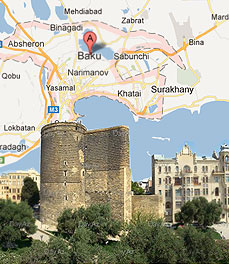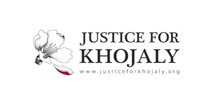Police Child Unit
Homepage ›Useful linksDirections of activity of IAB in protecting the rights of citizens being under age and the prevention of offenses committed by them.
As well as the protection of minors is important due to the fact that they are social reserve of prospective development of society, it is reasonable to study comprehensively the related socio-demographic and psychological characteristics during the investigation of their crimes. The study of these features helps to determine the cause and circumstances of offenses committed by juveniles, as well as preventive measures taken against them.
In this regard, in our Republic the sufficient legal framework was created to protect the rights of citizens who are under age, prevention of offenses committed by them, as well as the preventive measure. Currently, the basic law of the country, acting to protect the rights of children, is the law of the Republic of Azerbaijan "On the Rights of the Child".
This law is in accordance with the Constitution of the Azerbaijan Republic, Declaration of the Rights of the Child, the UN Convention on the Rights of the Child and other international regulations, establishes the rights and freedoms of children in the Republic of Azerbaijan, the basic principles of the state policy on children, the problem of state bodies, as well as other legal and physical persons in the protection of children's rights; maintenance of children's rights and combating child homelessness, along with other executive bodies give broad powers to the Internal Affairs Bodies, and persons accused of violating the law, shall be liable in accordance with the legislation of the Azerbaijan Republic.
In addition, in connection with the Law of the Azerbaijan Republic dated on 24.05.2005 "On the prevention of homelessness and juvenile delinquency" and Decree No. 274 dated on 09.08.2005 of the President of the Republic of Azerbaijan regarding the application of this law, to determine the rules of the internal affairs bodies' activities related to the protection of children's rights, the prevention of child neglect and delinquency, "Instructions concerning the internal affairs bodies to prevent homelessness and juvenile delinquency", approved by the Order of the Ministry of Internal Affairs dated on 24.02.20117, and Presidential Decree dated on May 8, 2012 "On approval of the State Control rights of the Child", in addition to defining the rights of police officers, set important tasks for them.
Police officers enforce private and general preventive measures (private preventive measures - preventive activities carried out privately in the family, being in a socially dangerous situation, and the child whose behavior is not controlled, or minor, the perpetrator; general preventive measures - a set of preventive and rehabilitation actions, together with government and non-governmental organizations, to the families that are at risk, as well as children whose behavior is not controlled, or minors who have committed an offense) against a minor, as well as families in socially dangerous situation (not fulfilling its responsibilities for the upbringing, education and keeping of minors, negatively affecting their behavior or showing ill-treatment to them).
In relation to below listed under age persons, private and general preventive measures are taken:
1. Neglected children (children, uncontrolled properly as a result of not receiving education and training, as well as non-compliance or inadequate execution of tasks on the keeping by their parents or other legal representatives) and homeless children (children with no particular place to stay).
2. Problem children (children, intractable for education in family, violating the requirements of the internal charter of tje school where they receive education, and evading education, not adapting to the rules of living together, having craving for hobo lifestyle, as well as to offenses) .
3. Engaged in vagrancy (left without care and control of their parents or other legal representatives, as well as educational institutions, not having place and means for life, living through regular begging or petty theft).
4. Living an immoral life, registered by the internal affairs bodies for various offenses, but not amenable to be corrected, as well as deviating from general secondary education.
5. Using tobacco products, alcoholic beverages, and in violation of the rules established by the legislation, taking drugs and psychotropic substances without medical indication or prescription.
6. Committing acts that harm relations, protected by the Code of Administrative Offences.
7. Dismissed from liability or punishment using compulsory educational measures on the basis of Articles 88 and 89 of the Criminal Code.
8. Committing socially dangerous acts, under the Criminal Code, but not attaining the age prescribed by law for the prosecution (liability is incurred by persons who have attained the age of 16 prior to the offense. A liability of persons under 14 years, is possible only for offenses listed in Article 20.2 of the Criminal Code).
9. Suspects or accused persons in respect of which preventive measures have been taken except for arrest.
10. Persons prematurely freed from punishment on the basis of an amnesty or pardon, or Article 90 of the Criminal Code. 11. Persons released from the reformatory.
12. Persons convicted for a certain period on penalties, with the exception of imprisonment (under Article 85 of the Criminal Code juvenile can only be applied to fines, community service, correctional labor and imprisonment for a fixed term).
13. Under age of 16, wilfully and maliciously leaving their home, special educational and other child care institutions.
14. Lost and abandoned or rejected by their parents or other legal representatives.
15. Persons whose criminal proceedings have not been opened or have been discontinued.
Besides officers enforce private and general preventive measures against parents or other legal representatives not meeting their responsibilities for the upbringing of minors, providing education and keeping them, that negatively impact on their behavior, or are committing against them cruel and violent actions, as well as attracting children to vagrancy, begging and other illegal acts.
Officers in addition to the implementation of preventive actions to protect the rights and interests of minors, find out the causes and conditions of their falling into undesirable social status, in accordance with the principles established by the law place in the public and non-governmental institutions children requiring state assistance and care, and stray, abandoned, rejected, having no place or means to live minors are sent to public and non- governmental rehabilitation centers and social shelters.
Besides officers consider appeals of parents and other legal representatives or officials who do not perform their tasks on upbringing, the provision of education and not keeping minors and provide information to the relevant authorities regarding the causes and events that create an opportunity for child neglect and commission of offense by them.
In general, officers consider and eliminate within their powers cases involving any negative activities regarding the juvenile and performed by them personally, if required, provide information or suggestions to the relevant authorities, management, organizations and businesses.
In this connection, the service is organized and shall work in cooperation with other police forces, as well as governmental and non-governmental organizations. Thus, structures such as the police investigation and inquiry, public safety, public traffic police, passport registration, field service, and others taking a direct part in activities to prevent homelessness and delinquency of minors and protection of their rights, in addition to performing their official duties in the implementation of these tasks, provide service with required information.
In addition to this service builds and operates on the basis of counter operation and exchange of information with the Commission on rights and work with juvenile under the city (district) executive power, social protection and social service institutions, educational authorities and institutions, guardianship and custodianship agency, bodies and agencies working with youth, health authorities, government bodies on issues of family, women and children, and their local organizations, governmental and non-governmental institutions, as well as international organizations dealing with the protection of children's rights.
On the basis of legislation, officers register minors and their parents, making for them private preventive work (PPW) enforces appropriate preventive measures. Minors are registered starting from 11 to 18 years. For parents, the age limit is not set.



